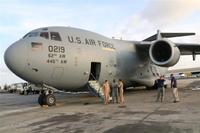-
U.S. to commit 4,000 soldiers, $750 million in the next six months to fight Ebola in Africa

The Pentagon’s effort to help eradicate Ebola in West Africa will require roughly 4,000 American soldiers, cost $750 million for the next six months, and may last longer than a year.American troops will help build seven testing labs and seventeen treatment facilities by mid-November, but troops will be on the ground in Liberia for at least a year.A majority of U.S. soldiers will not come in direct contact with Ebola patients, but a few dozen troops trained to operate in nuclear, biological, and chemical environments will be assigned to testing labs.
-
-
Law enforcement agencies use technology to compensate for shrinking budgets
With funding shrinking in many sectors of law enforcement, agencies are searching for new ways to operate affordably while maintaining quality standards.Police departments’ budgets quadrupled between 1982 and 2006. With federal budgets shrining, there are simply too many challenges which would not allow for police budgeting-as-usual.
-
-
Cost of U.S. war on ISIS reaches $780 million
The cost of the war against the Islamic State (ISIS) Islamist group has totaled at least $780 million, according to a new estimate, as U.S. warplanes and drones continued to strike Isis positions in Iraq and Syria on Monday and Tuesday. Defense Secretary Chuck Hagel said on Friday that the U.S. military is spending up to $10 million a day and will likely request more money from Congress to fund the war. The attacks on ISIS began 8 August, and before they were expanded to include targets in Syria, the Pentagon estimated the daily war costs at $7.5 million.
-
-
Napa earthquake may persuade lawmakers to fund earthquake warning system
Last Sunday’s Napa earthquake may push Congress to increase funding for an earthquake warning system. Building out the West Coast earthquake warning system, called ShakeAlert, would cost $120 million over five years, and an additional $16 million a year to operate. Today, ShakeAlert operates in a testing phase, and sensors notify researchers and volunteer participants when an earthquake has been detected.
-
-
Crime rates affected by who has administrative, budgetary responsibility for prisons
In 2011, the U.S. Supreme Court forced California to deal with the massive overcrowding in its prison system. The resulting reform shifted administrative and budgetary responsibility for low-level criminals from the state prison system to county jails. As a result, local California jails now face more overcrowding than ever, and local law enforcement is saddled with additional costs for imprisoning arrestees. In Israel, the trend has been in the opposite direction: an administrative reform which transferred authority over jails from the police to the Prison Authority resulted in the police sending more people to jail. A new study found that police are more inclined to issue arrests when prisons have administrative responsibility for detainees. The effect on crime: crime in Israel dropped as a result of the reform largely because the police — feeling less budgetary pressure — felt free to arrest more suspects, many of whom would have gotten off in the past with a warning.
-
-
No extra funding for increased Pentagon presence on southern border
Marine Corps Gen. John Kelly, commander of U.S. Southern Command (SOUTHCOM), has stated that illegal immigration and its effects are threatening to destabilize the region and are a national security threat to the United States. President Barack Obama’s $3.7 billion supplemental request to congress, however,, does not include any additional funding for military operations.
-
-
Pentagon should use reduced budget to prepare for "great power conflict": study
As sequestration takes toll on the Pentagon’s budget, Defense officials must decide how to maintain superior military capabilities. A new study suggests that the Pentagon should focus more on a “great power conflict,” reflective of a newly aggressive Russia and rapidly modernizing China. Such an approach would force the department to modernize its current infrastructure and invest significantly in technological advantages at the expense of unlikely-to-be used ships, aircrafts, and soldiers.
-
-
Obama administration wants $500 million to train, equip moderate Syrian rebels
The Obama administration is planning to escalate U.S. involvement in the Syrian civil war, and has asked Congress for $500 million for the U.S. military to train and equip moderate Syrian rebels. The training program would be the most significant action yet by the United States in the conflict in Syria. Yesterday’s (Thursday) request to Congress comes as the administration is looking for effective alternatives to the jihadist ISIS which is now in control of large swaths of Syria and Iraq. The $500 million request is separate from the $5 billion Counterterrorism Partnerships Fund, of which some $1.5 billion would go toward counterterrorism efforts in countries around Syria — Jordan, Lebanon, Turkey, and Iraq. The president also wants to set aside $500 million to “address unforeseen contingencies” in counterterrorism, which administration officials said was a reference to developments in Iraq.
-
-
Congress may modify the amount, manner by which Project BioShield procurements are funded
In 2004, Congress passed the Project BioShield Act to provide the federal government with new authorities related to the development, procurement, and use of medical countermeasures against chemical, biological, radiological, and nuclear (CBRN) terrorism agents. Among other things, the authority allows the government to guarantee a market for CBRN medical countermeasures. Under this provision, the secretary of Health and Human Services (HHS) may obligate funds to purchase countermeasures that still need up to ten more years of development. Since 2004, HHS has obligated approximately $3.309 billion to guarantee a government market for countermeasures against anthrax, smallpox, botulism, radiation, and nerve agents. Another provision established a process through which the HHS secretary may temporarily allow the emergency use of countermeasures which lack Food and Drug Administration (FDA) approval. The 113th Congress may also consider modifying the amount and manner by which it funds Project BioShield procurements.
-
-
2015 DHS budget is border patrol “wish list”: critics
Last week, the House Appropriations Committee approved $39.2 billion 2015 budget for the Department of Homeland Security (DHS). Critics were quick to point out that many items in the budget were not on the original budget request, but were since added after showing up originally on a wish list of hardware that could improve and extend the surveillance capabilities of DHS.
-
-
Badly engineered missile defense systems deployed “because there was a rush”
In 1983 President Ronald Reagan launched the Strategic Defense Initiative (SDI) to build space- and ground-based missile defense systems. The space-based component was abandoned as impractical, and the focus shifted to Ground-based Midcourse Defense systems (GMD). Despite disappointing results and program test failures, Congress and the George W. Bush administration pressed forward with spending billions on acquiring systems of questionable reliability. “We recognize the problems we have had with all the currently fielded interceptors,” Undersecretary of Defense Frank Kendall old an industry gathering in February 2014. “The root cause was a desire to field these things very quickly and very cheaply; we are seeing a lot of bad engineering, frankly, and it was because there was a rush.”
-
-
Number of structurally deficient bridges in U.S. declines

The number of structurally deficient bridges in the United States has declined by 14 percent in the last six years, but despite the improvement, 10 percent of American bridges are in need of maintenance, rehabilitation, or replacement. The average age of bridges in the country is forty-three years old, and most bridges were built to last for fifty-years, so eventually all bridges will become structurally deficient unless they are repaired or replaced.
-
-
S.D. high on the list of recipients of DHS funds, even as it faces “no specific or domestic terrorist threat”
Following the 9/11 terrorist attacks, DHS has established an office in each state which oversees millions of dollars in federal grant and aid money for security related measures. Groups monitoring the DHS allocation of funds to states note the large amount of money allocated to South Dakota, despite the fact that the state is considered by intelligence agencies and officials to be one of fifteen states that have “no specific or domestic terrorist threat.”
-
-
Recession-related cost measures blamed for U.S. infrastructure lagging development
In an alarming fall, the United States is currently ranked 19th in the quality of its infrastructure, according to the World Economic Forum’s Global Competitiveness Report. Additionally, the American Society for Civil Engineers (ASCE) has given the country a D+ on its annual Infrastructure Report Card, arguing that $3.6 trillion is needed by 2020 for maintenance and upgrades.
-
-
DHS HQ: Doubts grow about trouble-plagued St. Elizabeths complex

DHS was supposed to move into its new, centralized headquarters on the grounds of the historic St. Elizabeths, in 2015, at a cost estimated to be about $3 billion. Today the project is $1.5 billion over budget, eleven years behind schedule, with thousands of DHS employees working at more than fifty scattered, expensively leased office buildings. Some lawmakers doubt whether the complex will ever be completed. A congressional aide familiar with sentiments on the Hill says: “It’s [the original St. Elizabeths complex plan] just not going to happen. The money doesn’t exist.”
-
More headlines
The long view
Factories First: Winning the Drone War Before It Starts
Wars are won by factories before they are won on the battlefield,Martin C. Feldmann writes, noting that the United States lacks the manufacturing depth for the coming drone age. Rectifying this situation “will take far more than procurement tweaks,” Feldmann writes. “It demands a national-level, wartime-scale industrial mobilization.”
Trump Is Fast-Tracking New Coal Mines — Even When They Don’t Make Economic Sense
In Appalachian Tennessee, mines shut down and couldn’t pay their debts. Now a new one is opening under the guise of an “energy emergency.”
